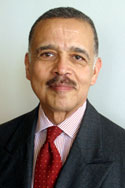ARCHIVES
OF EDITORIALS
July 7, 2005
Keep the black press independent
Is the black press still necessary? African Americans
whose goal is complete assimilation would undoubtedly answer in
the negative. Their financial success has enabled them to leave
their brethren in the center cities for a more comfortable life
in the suburbs. Having climbed the economic ladder they have become
emotionally removed from the problems of blacks who are still
struggling.
Many harbor the mistaken belief that the battle for racial equality
is over. It is easy to be deceived about the status of blacks
in America. There has been substantial improvement in race relations
in the past 40 years. The battle for civil rights is essentially
over. However, thoughtful African Americans have always been concerned
with more than the elimination of racial discrimination. The real
goal is full equality.
America is a very competitive society. Every ethnic group which
landed on our shores has found it necessary to struggle as a group
to find a way to earn a living. It did not take long for immigrants
to learn that political power and economic success are closely
connected.
The black press was an important institution in organizing opposition
to the indignity of separate drinking fountains, the denial of
access to restaurants and movie theaters, and the rejection of
the right to vote. Those were all “in your face” issues
which were very easy to understand. Now we live in an age when
the issues are far more complex and subtle. Only the black press
can be entrusted to unravel these issues and advocate unequivocally
for the interests of African Americans.
Unfortunately, the financial progress of African Americans has
attracted a number of journalistic carpetbaggers. Community activists
focus on the fact that African Americans have an annual income
of $682 billion. Yet the black press and other ethnic media get
only two percent of advertising dollars. This is a potentially
rich market for advertisers.
A recent study of ethnic print media found that 66 percent of
readers cite their African American newspaper as the primary or
only source of local news. Only 12 percent subscribe to a daily
newspaper, and 72 percent frequently purchase products advertised
in their black newspaper.
White publishers, attracted by the opportunity of generating advertising
revenue, have begun to launch newspapers directed to black readers.
In Boston a company from West Roxbury publishes the Peoples’
Voice for Roxbury and in Gainesville, Florida the New York Times
plans to launch a newspaper directed toward black readers.
While the black press needs revenue to survive, black papers are
much more than a medium for advertisements. It must be remembered
that in America competition for success is brutal. Blacks need
the advocacy of a demanding press to get their share of the pie.
Just as important, the black press is the primary recourse to
rebut the negative distortions of blacks that are constantly published
in the major media. For example, although two-thirds of the nation’s
poor are white, a study found that stories about blacks were used
by the major media 62 percent of the time. Such distortions are
damaging to both blacks and whites.
The two forms of secular power are politics and wealth. Blacks
will be unable to organize politically without their press. Without
a strong political base the development of wealth will be more
difficult. A strong black press will definitely be needed if blacks
are to become empowered in America.
Home
Page

